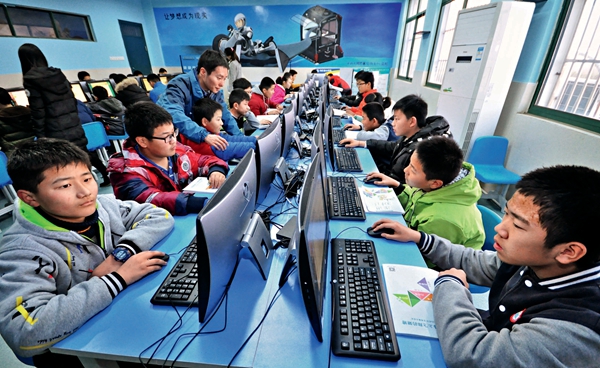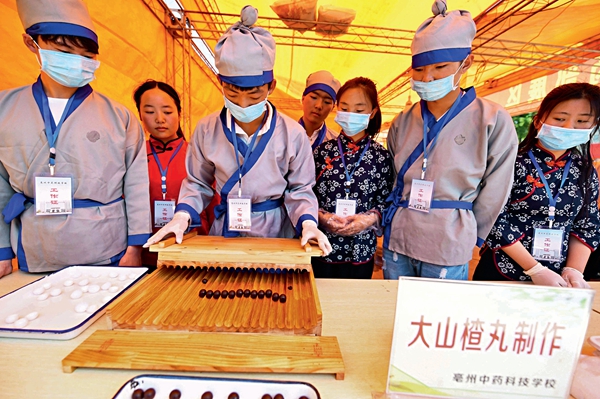Sowing Seeds of Comprehensive Development
China Today, June 20, 2017 Adjust font size:
Innovative Thinking
What society demands most from education – apart from laying a solid foundation for life-long learning – is to foster innovative thinking. As a result, scientific activities became popular in primary and middle schools.
Beijing Jiaotong University and its affiliated primary school jointly set up a robot lab, providing courses for select seventh and eighth graders all over Beijing. Professor Yao Yan’an, the designer of the geometric robot, welcomed Michelle Obama to his class during the former first lady’s trip to China in 2014. Under his guidance, 30 seventh graders succeeded in making robots of their own. Some of the students had travelled a long way from the suburbs.

Students learn 3D printing techniques at No. 19 Middle School in Hefei City, Anhui Province, on January 10, 2017.
As of September 2015, all junior middle school students in Beijing are required to go to colleges, research institutes, science museums, and high-tech companies for practice and on-site study. The Beijing Municipal Education Commission requires seventh and eighth graders to participate in five scientific activities every semester, for two hours at a time. The commission hopes that this experience will ignite thes students’ enthusiasm for innovation and strengthen their practical ability.
At the request of the Beijing Municipal Education Commission, many colleges, research institutes, and enterprises in Beijing have carried out a profusion of activities for students, mostly in areas such as nature and the environment, health and food safety, structure and mechanism, electronics and control, data and information, and energy and materials. Social resources are well integrated with curriculum standards for physics, chemistry, and biology.
In the fall semester of 2015, 851 scientific activities were carried out in 202 companies and institutes in Beijing. In the spring semester of 2016, the numbers increased to 1,009 and 255 respectively, which means a total of 270,000 class hours have been provided to 88,000 junior middle school students.
Innovation is an ability that future society demands. In fact curiosity and creation are innate talents, for example, children like to raise questions as soon as they can speak, and students take the initiative to study if they have questions in mind. The extracurricula activities just aim to retain youngsters’ curiosity and nurture their ability to discover.
“Do It Yourself” Approach
“Do you know how to make a tablet?” Students asked their parents after taking a class at the No.2 Vocational School in Daxing District, Beijing, in which they made tablets of their own. Song Jinping, a teacher from the vocational school, said that the school has launched more than 20 courses for primary and middle schools, including classes in electronics and mechanics, logistics, dessert making, and biopharmaceuticals. The courses pair the school’s strengths with the interests and characters of young students. The “do it yourself” approach makes a deep impression on students and gives them a better understanding of different professions.

Students at the Bozhou Traditional Chinese Medicine and Technology School in Anhui Province make TCM boluses.
Vocational schools in Beijing have now taken on the task of career education for primary and middle school students. In October 2016, more than 200 students from Beijing No. 1 Middle School and Heizhima Hutong Elementary School came to Beijing International Vocational Education School. During the day, they became IT engineers, bakers, stylists, programmers, and CEOs. “Working creates life” – this is no longer an empty slogan for students, but perception gained through work and practice.
Beijing’s Dongcheng District has established experience centers in vocational schools, allowing primary and middle school students as well as residents to experience different careers and develop professional skills. Xu Jianqiu, vice director of the Dongcheng District Education Commission, said these career education courses have been introduced to all schools and are open to all students in the district.
Vocational education is expected to play an important role in further education, and as a result, skilled workers will be more respected in society.